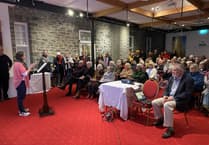I READ with interest Mr Bentley' s argument (Letters, May 13) for the proposed Tavistock to Plymouth railway as a useful commuter service. However, as a seasoned commuter myself (I spent 30 years travelling daily into the City of London variously from Cambridgeshire, Kent and Essex), I have to disagree with him.
His examples of vaguely estimated relative costs and of journey times are interesting but he has completely overlooked another major factor.
People who have to decide upon the best way to travel to work are also concerned with arriving at their destination at the time they need to be there. How much time does a 30-minute train journey save you if it gets you to work an hour early? Or if you have to wait an hour for the train after work? What about the pressure of having to be at the station on time, every time, because there's no 'next train' to catch? And all this without factoring in the time it takes to get to and from Tavistock station.
Kilbride's draft timetable showed, provisionally, that the only direct trains for commuters would arrive in Plymouth at 0634 and 0846. So, in effect, only those who start work between about 0645 and 0700 or between 0900 and 0915 would even consider using the service. Not only that, but they would also need to finish work at a convenient time to catch the 1516 or the 1729 train home.
Even if the Kilbride timetable that I have seen has been, or will be, modified to provide a more frequent service, only a train every 15 minutes would really solve this problem, but there is not the remotest chance that there would be sufficient commuters to justify such a service, even if it were possible on a single-track line.
There may be some mileage in pushing the idea of this railway as a quirky tourist attraction (though I doubt it), and there may indeed be a few people who would use it to travel to work, but it is disingenuous to try to promote this as a commercially viable service, or as a real alternative to travelling by road (whether by car or by a frequent bus service).
Passenger railways lose money even if they are heavily used. A part-time token train service like this will need heavy subsidy forever, and I would rather the tax I pay was not wasted in supporting it.
Tony Belcher
Meadow Brook
Tavistock
MR Mercer (Letters May 6) seems to be a little confused in his reply to my letter (April 22) and unfortunately, continues to miss the point that cycling is so much more than a hobby.
True, carrying a weekly shop for a family on a bicycle is a little tricky, but with suitable panniers and careful packing, smaller amounts of shopping are not a problem - and I fail to see how building a railway will help people with their weekly shop - unless its in conjunction with other forms of transport e.g walking, cycling, bus and car.
The main argument in the letters page over the proposed railway, seems to be about alleviating overcrowding and road congestion, and whether it will be effective or efficient as a means of commuting to Plymouth — on the latter point the general opinion seems to be 'not very'.
Our roads are becoming more and more congested and resources of oil and natural gas are finite — whether you believe they will run out sooner or later, they will run out. I ask what we do then? Cycling does away with a reliance on fossil fuel and is a stress-free way to start and finish the day.
With a bicycle you are free to start your journey whenever you please, however, unlike in a car you will never be hampered by traffic jams or inconvenienced by public transport timetables that do not suit you. These are just some of the reasons that Tavistock is now a cycling hub and why there is investment in cycling routes.
Many countries around the world already recognise that the humble bicycle has so many more uses that just 'popping' down to the newsagent. Until we also start to see the bicycle as a viable form of transport, by investing in cycle routes, and as part of a far wider investment into an integrated public transport system, then our road congestion problem will only increase.
Cycling is fun and a great hobby, but it is so much more than that - and you don't need to be 'hardy' to do it. Rather than waiting for a railway to be built or more buses to run, you can make a difference today, by starting to cycle. To paraphrase an old advertising campaign: 'Free with every bicycle — You!'
Murray Turner
Bikeability National Standard Instructor
Bere Alston



